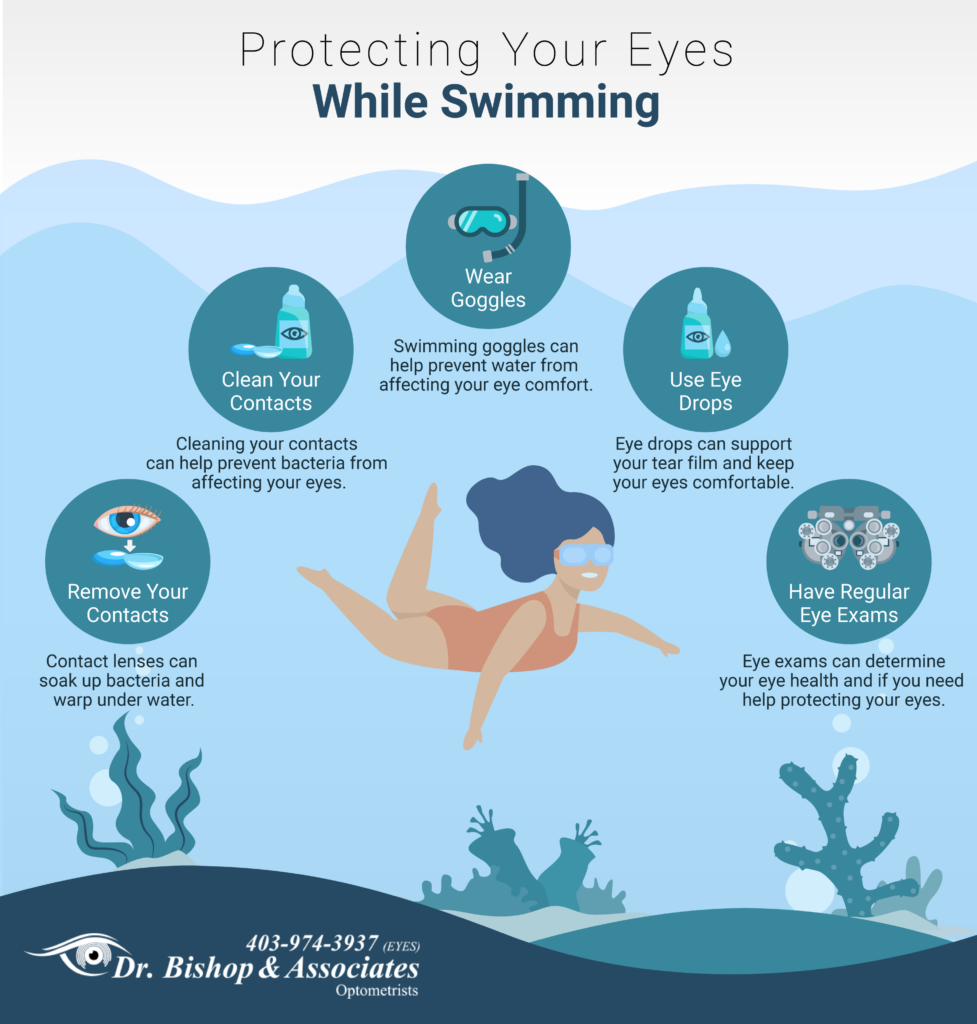Yes, you can wear contacts in the pool, but it is not recommended due to the potential risks involved. Chlorinated water can cause discomfort, dryness, and potential damage to the lenses or eyes.
Additionally, pool water contains various bacteria and microorganisms that can adhere to the lenses and lead to eye infections. It is safer and more hygienic to wear prescription goggles or avoid wearing contacts altogether while swimming.
Potential Risks Of Wearing Contacts In The Pool
Potential Risks of Wearing Contacts in the Pool
Chlorine And Other Chemicals
Chlorine and other chemicals used to keep pool water clean and safe can pose a significant threat to contact lens wearers. When contacts come into contact with pool water, these chemicals can cause irritation, dryness, and discomfort to the eyes. The porous nature of contacts may also lead to absorption of these chemicals, resulting in further damage.
Waterborne Bacteria And Microorganisms
Pool water can be a breeding ground for various waterborne bacteria and microorganisms. When wearing contacts, the risk of infections such as conjunctivitis and keratitis is heightened as the lenses can trap these harmful organisms against the eye’s surface. These infections can lead to redness, swelling, and potentially vision loss if left untreated.
Consequences Of Wearing Contacts In The Pool
Wearing contacts in the pool can lead to serious consequences. Chlorine and bacteria in the water can damage the lenses and increase the risk of eye infections. It is advisable to remove contacts before swimming to protect your eyes.
Consequences of Wearing Contacts in the Pool Wearing contacts in the pool can lead to various negative outcomes, primarily affecting eye health. Irritation and infections are common issues that may arise from this practice. H3 headings: 1.
Irritation And Redness
– Prolonged contact lens use while swimming can cause eye irritation and redness. – Chlorine and other pool chemicals irritate the eyes, exacerbating the discomfort. 2.
Risk Of Eye Infections
– Exposing contact lenses to pool water increases the risk of bacterial or viral infections. – Microorganisms in the water can adhere to contacts, leading to serious eye conditions. Be aware of the dangers associated with wearing contacts in the pool. Prioritize your eye health by abiding to these guidelines.
Tips For Safely Wearing Contacts In The Pool
Discover essential tips to safely wear contacts in the pool such as using waterproof goggles, removing lenses before swimming, and avoiding prolonged exposure to water to prevent eye infections and discomfort. Prioritize eye health by following these guidelines for protecting your vision while enjoying pool activities.
Introduction:
When going for a swim, many contact lens wearers may wonder if it is safe to wear their contacts in the pool. While it is generally recommended to remove your contacts before swimming, there are some precautions you can take to minimize the risk of eye irritation or infection. In this article, we will provide you with some essential tips for safely wearing contacts in the pool.
Use Waterproof Goggles
Using waterproof goggles is an effective way to protect your eyes and contacts while swimming. Goggles create a barrier that prevents pool water from coming into direct contact with your eyes and lenses, reducing the risk of contamination and irritation. Ensure that the goggles fit properly to prevent water leakage.
Consider Daily Disposable Lenses
If you prefer to swim without goggles or are participating in water sports where goggles may not be suitable, consider wearing daily disposable lenses. Daily disposables allow you to simply discard the lenses after swimming, reducing the time your eyes are exposed to potentially harmful pool water.
Daily disposable lenses are designed for one-time use, which means you won’t have to worry about cleaning and storing them properly after swimming. They also minimize the risk of bacterial buildup on the lenses, keeping your eyes safe and comfortable.
If you are not a daily disposable lens wearer, consult your optometrist to see if they are a suitable option for occasional water activities.
Conclusion:
By using proper precautions such as waterproof goggles and considering daily disposable lenses, you can enjoy swimming while still wearing your contacts. However, if you experience any discomfort or irritation, it is recommended to remove your lenses immediately and consult with your eye care professional. Remember, prioritizing the health and safety of your eyes should always be the top priority when it comes to wearing contacts in the pool.
How To Properly Clean Contacts After Swimming
Rinsing With Saline Solution
After swimming, rinse your contacts with sterile saline solution to remove chemicals and bacteria.
Disinfecting With Contact Lens Solution
Disinfect your contacts by storing them in contact lens solution overnight to kill any remaining bacteria.
Alternatives To Wearing Contacts In The Pool
If you’re an avid swimmer, you may be wondering about the best way to enjoy the pool without compromising your vision. While wearing contacts in the water is generally not recommended, there are alternatives that can help you see clearly while swimming. Let’s explore two common options – Prescription Swimming Goggles and Refraining from Wearing Contacts.
Prescription Swimming Goggles
If you need vision correction and want to swim comfortably, prescription swimming goggles are a great choice. These goggles are specially designed to accommodate your prescription lenses, allowing you to see clearly underwater. Whether you have nearsightedness, farsightedness, or astigmatism, there are prescription goggles available to suit your needs.
One of the biggest advantages of prescription swimming goggles is the clarity they provide. With your precise prescription incorporated into the lenses, you won’t have to worry about blurry vision while swimming. These goggles also seal tightly to prevent water from entering, keeping your eyes protected and reducing the risk of irritation or infection.
Refrain From Wearing Contacts
Another alternative is to simply refrain from wearing contacts in the pool altogether. This option is particularly suitable for those who only need visual correction for short distances and can manage without it while swimming.
Refraining from wearing contacts in the pool eliminates the risk of waterborne microorganisms adhering to your lenses or getting trapped between your contacts and your eyes. These microorganisms can cause various eye infections, including conjunctivitis and keratitis. By removing your contacts before swimming, you can minimize the risk of such infections and ensure your eyes stay healthy.
- Further advantages of refraining from wearing contacts in the pool:
- No need to worry about your contacts slipping or falling out while swimming.
- Save money by not using disposable contacts solely for swimming activities.
- Reduce the hassle of cleaning and maintaining contacts after swimming.
Ultimately, the decision of whether to wear contacts in the pool or explore alternatives depends on your level of visual correction needs and personal preferences. Prescription swimming goggles offer a convenient solution for those who require clear vision while swimming, while refraining from wearing contacts is a simple and effective way to avoid potential eye infections. Consider the options carefully, and choose the one that suits you best to ensure a safe and enjoyable swimming experience.

Credit: www.lenspure.com
Consulting An Eye Care Professional
Importance Of Seeking Professional Advice
When considering wearing contacts in the pool, it is crucial to seek professional advice from an eye care specialist. Consulting an optometrist or ophthalmologist before making any decisions is essential for your eye health and safety. They can provide valuable insights and recommendations based on your individual situation, helping you make informed choices.
Customized Recommendations
Eye care professionals can offer customized recommendations tailored to your specific needs. They can assess factors such as your eye health, the type of contacts you use, and any potential risks associated with wearing contacts in the pool. By obtaining personalized advice, you can minimize the chances of adverse effects on your eyes and ensure the utmost protection.
Real-life Experiences: Wearing Contacts In The Pool
Considering whether it’s safe to wear contacts in the pool? It’s crucial to prioritize eye health. While some swimmers choose to wear contacts, it’s important to be cautious of potential risks such as eye infections and irritation. Always consult with an eye care professional for guidance.
Real-Life Experiences: Wearing Contacts in the Pool Wearing contact lenses in the pool can be a hotly debated topic. Many individuals wonder if it’s safe or if they’ve experienced any discomfort. Personal testimonials reveal valuable insights into this matter, shedding light on various experiences and lessons learned.
Personal Testimonials
| Name | Experience |
|---|---|
| Emily | Felt discomfort and irritation in the eyes after swimming with contacts |
| John | Experienced no issues and regularly swims with contacts |
| Michael | Developed an eye infection after wearing contacts in the pool |
Lessons Learned
- Eye irritation and discomfort can occur for some individuals when wearing contacts in the pool.
- Swimming with contacts increases the risk of eye infections due to waterborne bacteria and microorganisms.
- Using waterproof swimming goggles can be a viable alternative to wearing contacts in the pool.
- Regularly cleaning and disinfecting contacts is crucial for maintaining eye health, especially after swimming.

Credit: www.today.com

Credit: m.youtube.com
Conclusion
Remember, wearing contacts in the pool can lead to serious eye infections. It’s best to opt for prescription goggles instead. Your eye health is important, so always prioritize safety over convenience when it comes to water activities. Take care of your eyes and enjoy a worry-free swim!





